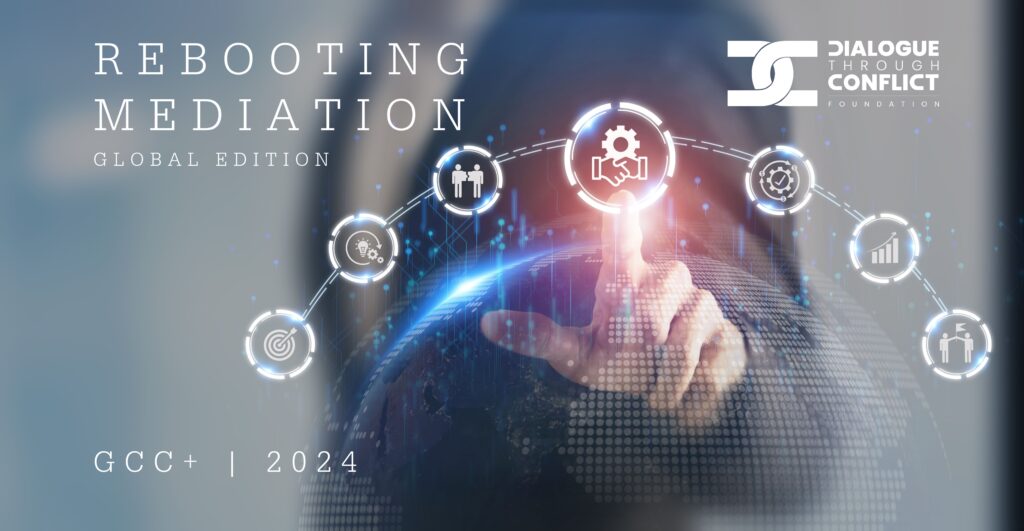Rebooting Mediation (GCC+)
This questionnaire seeks to gather information about mediation legislation for civil and commercial cases in the GCC Member States, Algeria, Morocco, Tunisia, Egypt, and Jordan, and Lebanon, excluding mediation in family disputes, and to uncover why mediation is still not being used as much as anticipated.
A study conducted a decade ago addressed this question in the European Union. That study, entitled ‘Rebooting’ The Mediation Directive: Assessing the Limited Impact of its Implementation and Proposing Measures to Increase the Number of Mediations in the EU., is currently being updated and, together with the study resulting from this questionnaire and identical ones in other parts of the world, will become part of a global study conducted by the Dialogue Through Conflict (DTC) Foundation.
As in the earlier study, the research team is distributing its questionnaire on a large scale to a variety of GCC dispute resolution experts, including, but not limited to, mediators, judges, and attorneys engaged in different types of practices. This questionnaire will be available from May 2024 to June 2024. For more information about the background of the study and its methodology, please consult the DTC Foundation website (so far, in English only).
The collected data will be anonymized, aggregated, and analysed by the research team to assess the current situation and discern possible future measures that can be recommended to legislative bodies and policy makers to further foster the use of mediation in civil and commercial disputes in the GCC countries. The results of the study will be published by the Fall of 2024 in a report that will be presented to relevant international organizations and governments. The report will also be available on the DTC Foundation website.
Part I of the questionnaire aims to gather your estimate of the current mediation market in your country. Part II is a quick assessment of the existing laws in your country. Part III includes a list of legislative solutions (Part IIIA) and non-legislative proposals (Part IIIB) for you to assess in terms of their ability, or inability, to make more mediations happen in your country. Part IV is devoted to gathering information on mediation and litigation costs in your country.
Responding to the questionnaire is easy. It simply asks you to choose among existing options or to rank a number of proposals. If your preferred answer is not listed amongst the options, please choose the closest answer to the situation in your country. Please only use the option of ‘Other’ if the situation in your country is radically different from all of the designated options presented.
Your responses to the questionnaire are very important to us. The survey is anonymous; all responses will be kept confidential and no personally identifiable information will be shared. The Dialogue Through Conflict (DTC) Foundation will process the personal data of the respondents only for the purposes of this specified research, and all personal data will be stored securely, in strict compliance with legal requirements. Only generalized and anonymized information will be shared publicly.
METHODOLOGY
The research team elected to analyze the following aspects of each Member States’ legislation, all of which were also analyzed for the original version of the study:
- the degree of regulation,
- subject matters that may be mediated,
- the degree of confidentiality,
- the voluntary or mandatory nature of mediation or mediation information meetings,
- cost incentives and sanctions,
- the existence of court referrals to mediation,
- the enforceability of the mediation settlement agreement,
- training and accreditation of mediators,
- the existence or non-existence of the lawyers’ duty to inform clients about mediation,
- the use of legal assistance in mediation, and
- statistics regarding mediation use.
The research team also added a few areas of analysis not covered in the original study, aiming to reveal not only existing legislation but also well-formed practices and the effectiveness of adopted measures in each country.
The questionnaire is designed to be distributed in multiple languages on an easily accessible online survey platform, with availability from June 2024 to … 2024. The link to the questionnaire will be available soon.
Once the questionnaire’s availability ends, the team will analyze the results and, as with the questionnaire from the original study, write a report. Part of the team’s work will be to compare the data obtained in 2024 with the data obtained in the original study. The results of the study will be published by the end of November 2024 in a report that will be presented to relevant international organizations and governments. The report will also be available in open access on this page.
Editor-in-Chief
Prof. Giuseppe De Palo, International Professor of ADR Law & Practice, Mitchell Hamline School of Law (USA)
Central Editorial Team
Dr. Emad Eddien Hussein, FCIArb, Independent Arbitrator and Mediator (UAE)
Dr. Zachary Calo, Founding Professor of the College of Law, Hamad Bin Khalifa University (Qatar)
Ms. Christine Maksoud, Founder of The Mediation Hub MENA, Senior Associate Al Tamimi (UAE)
Study Editors (per country)

